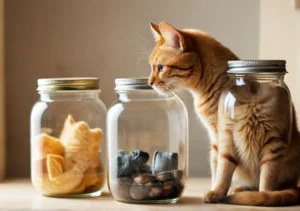Cats are known for their mysterious behaviors and unique characteristics, one of which is their often dry noses. Have you ever wondered why cats’ noses are dry? Let’s uncover the truth behind this feline phenomenon.
The Purpose of a Cat’s Nose
Have you ever stopped to wonder why cats have those cute little noses that sometimes feel dry to the touch? Well, let me tell you, a cat’s nose is not just for booping! Cats rely heavily on their sense of smell to navigate the world around them. Their noses are packed with sensitive receptors that help them detect scents, food, danger, and even the presence of other animals. So, that dry nose is actually a key tool in your cat‘s day-to-day life.
Factors Influencing Nose Moisture
Now, let’s get into why your furry friend’s nose might be feeling a bit dry. There are several factors at play here. One common reason for a dry nose in cats is environmental conditions. Just like us, cats can be affected by the weather, humidity levels, and even indoor heating. Another factor to consider is your cat‘s health. Dehydration or illness can also lead to a dry nose. If you notice your cat‘s nose is consistently dry, it might be worth a trip to the vet to rule out any underlying issues.
Additional Insight:
When it comes to environmental factors, keep in mind that cats with lighter fur colors tend to be more prone to sunburn on their noses, which can cause dryness. If your cat loves soaking up the sun, consider providing shade or sunscreen to protect their delicate nose.
Benefits of a Dry Nose
So, why are cats’ noses dry? Well, having a dry nose actually benefits cats in a couple of ways. One major advantage is improved scent detection. A dry nose allows for better reception of odors, helping cats pick up on various scents more effectively. This is crucial for hunting and navigating their environment. Additionally, a dry nose aids in communication abilities among cats. When a cat exchanges scent signals with others through rubbing or marking, a dry nose helps retain these scents for longer periods, facilitating better communication within their social groups.
Benefits of a Dry Nose for Cats: 1. Improved scent detection 2. Enhanced communication abilities
Signs of Potential Health Issues
Now, while a dry nose can be beneficial, it’s essential to keep an eye out for any signs that it could indicate an underlying health problem for your furry friend. If you notice your cat’s nose is excessively dry or cracked, it may be a red flag. Other potential signs of health issues include nasal discharge, sneezing, coughing, or changes in behavior. These symptoms could point to infections, allergies, or other health concerns that require veterinary attention. So, always pay attention to your cat’s nose as it might be trying to tell you something important about its well-being.
- Excessively dry or cracked nose
- Nasal discharge
- Sneezing or coughing
- Changes in behavior
Remember, while a dry nose can be normal for cats, it’s crucial to monitor any changes or unusual symptoms that may signal an underlying health issue. Always consult a veterinarian if you have concerns about your cat’s nose condition or overall health.
Hydration Tips for Cats
Keeping your furball hydrated is key to maintaining that perfect nose moisture. Place multiple water bowls around the house to encourage drinking. Add flavor to their water with a bit of tuna juice or low-sodium chicken broth to entice them. Consider a pet fountain – some cats prefer running water. Offer wet food in addition to dry kibble for extra hydration. Monitor their water intake to ensure they’re drinking enough throughout the day. And don’t forget to clean their water bowls regularly to keep things fresh.
Seasonal Variations in Nose Moisture
As the seasons change, so can your cat’s nose moisture. In hot weather, your furball might lose more water through panting and may need extra hydration. Keep water bowls topped up and offer cool, fresh water more frequently. During winter, indoor heating can dry out the air, affecting your cat’s nose. Use a humidifier to add moisture to the air, or place a bowl of water near a heat source to release water vapor. Observe your cat’s nose for any changes and adjust their environment accordingly to keep that nose just right.
Fun Facts About Cat Noses
Did you know that a cat’s nose contains ridges and bumps unique to each feline, much like a human fingerprint? This helps them retain scent particles longer, aiding in their remarkable sense of smell. Another fascinating fact is that cats’ noses can change color based on their mood or temperature regulation. So, next time you notice your furry friend’s nose feeling a bit dry, it might just be a sign of relaxation or a reaction to the environment.
Holistic Approaches to Cat Health
When it comes to promoting your cat’s overall well-being, incorporating holistic approaches can be beneficial. Ensuring your cat stays hydrated by providing fresh water and a moisture-rich diet can help prevent dryness in their noses. Additionally, using natural remedies like coconut oil or a humidifier can help maintain moisture levels and soothe dry noses. Remember, a holistic approach to cat health involves considering their physical, mental, and emotional needs for a happy and healthy feline companion.
- Regular Moisturization: Gently applying a small amount of pet-safe moisturizer to your cat’s nose can help alleviate dryness and prevent cracking.
- Balanced Diet: Offering a balanced diet rich in essential nutrients and hydration can contribute to healthy skin and a well-moisturized nose.
- Outdoor Protection: When your cat is outdoors, especially in extreme weather conditions, consider using pet-safe nose protectants like balms to shield their noses from harsh elements.
- Regular Vet Check-ups: Schedule regular check-ups with your veterinarian to monitor your cat’s overall health, including their skin and nose condition.
- Avoid Harsh Chemicals: When cleaning your cat’s environment, opt for pet-safe cleaning products to prevent irritants that could dry out their nose.
By incorporating these holistic approaches and mindful practices into your cat’s daily care routine, you can help keep their noses hydrated and healthy. Remember, a little extra care goes a long way in ensuring your feline friend’s well-being.
Why Are Cats’ Noses Dry?
Have you ever wondered why your feline friend’s nose feels dry to the touch? Contrary to popular belief, a cat’s nose being dry is not always a cause for concern. Cats have a natural tendency to regulate their nose moisture levels through mechanisms like grooming and licking. This behavior helps them keep clean and maintain their body temperature.
One common reason for a cat’s dry nose is simply dehydration. Just like humans, cats need to stay hydrated to ensure their bodies function properly. Encourage your cat to drink plenty of water and provide wet food to help keep them hydrated. If your cat’s nose remains persistently dry, it could be a sign of an underlying health issue. In such cases, it’s best to consult with your veterinarian for a proper diagnosis and treatment.
Conclusion
Remember, monitoring your cat’s nose moisture levels is just one small part of their overall health and happiness. Regular check-ups, a well-balanced diet, and plenty of love and attention are also essential to ensuring your furry companion stays healthy and content. By staying attentive to the little details, like your cat’s nose moisture, you can catch potential issues early and keep your feline friend thriving.
Alex, a passionate animal lover, has experience in training and understanding animal behavior. As a proud pet parent to two dogs and three cats, he founded AnimalReport.net to share insights from animal experts and expand his knowledge of the animal kingdom.




